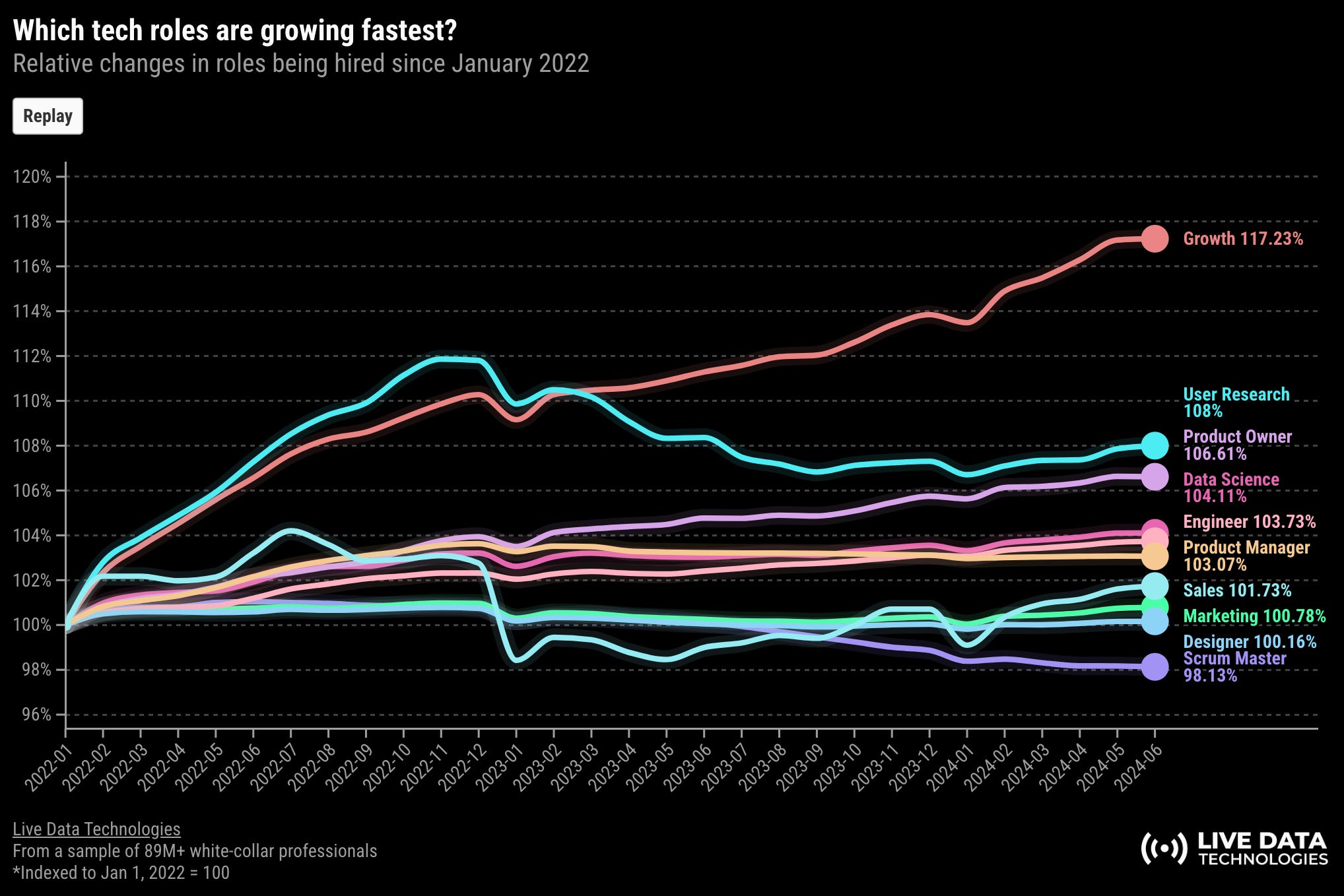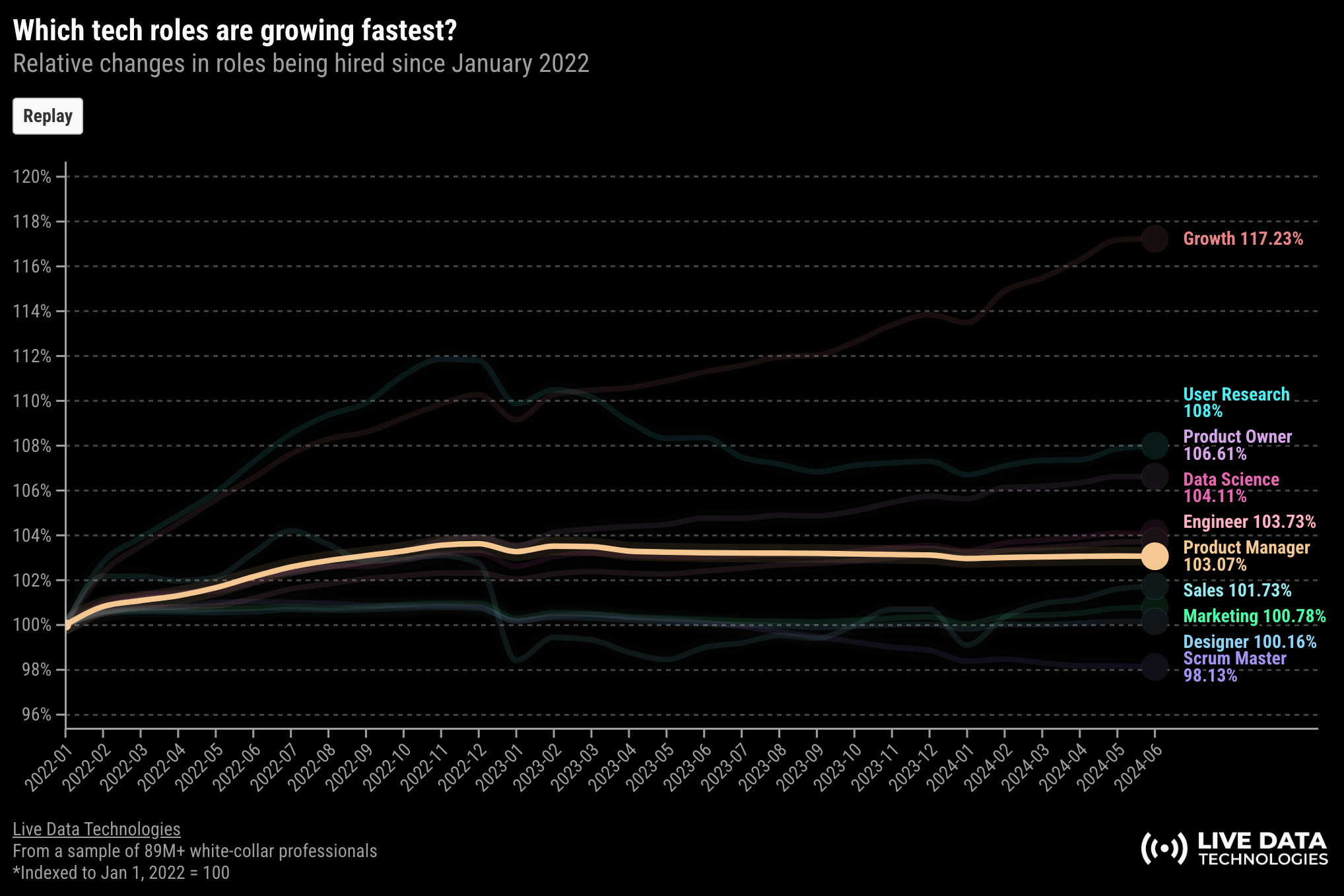New data on the product job marketWho’s hiring, what roles are growing, the one role that’s disappearing, and more surprising insights👋 Welcome to a 🔒 subscriber-only edition 🔒 of my weekly newsletter. Each week I tackle reader questions about building product, driving growth, and accelerating your career. For more: Find your next product leader | Podcast | Lennybot | Swag | Best of Lenny’s Newsletter ✨ Photos from recent reader meetups Clockwise from top left: Shanghai, Vancouver, New York, San Diego, Paris, Amsterdam If you’d like to attend (or host!) a meetup and are a paid newsletter subscriber, join our Slack and find your local city channel. Learn more here. With ongoing news of layoffs, shutdowns, and product roles being replaced by AI, it’s easy to get discouraged about the state of the job market, especially if you’re having a hard time finding a job. Is the market particularly rough for your role right now or is it just you? I’m excited to share hot-off-the-presses data I haven’t seen elsewhere about the state of the product (and product-adjacent) job market. This data comes from a company that I recently discovered, Live Data Technologies, which has developed a method of prompt-engineering major search engines (e.g. Google, Bing, Baidu, Yandex, etc.) to capture near-real-time data on employment changes. Leveraging this publicly available information, they use a proprietary process to monitor job changes for over 88 million people. They can track hiring trends across companies, roles, functions, levels, industries, and locations. The company normally sells this data to investors (e.g. VCs, private equity), startups (e.g. platforms that incorporate people data), HR orgs, and go-to-market leaders, and serves as a data resource to media outlets (e.g. the Wall Street Journal, The Economist), but, lucky for us, they offered to collaborate with me on this unique dive deep into the state of the product job market. A big thank-you to Jason Saltzman for hooking me up. We decided to analyze the 10 most popular product and product-adjacent roles: Product manager, Engineer, Design, Growth, User research, Data science, Sales, Marketing, Product owner, Scrum master. At the end of the post, I’ve included a sampling of the job titles included within each role. Here are my biggest takeaways and surprises from the data: 1. Growth roles are the #1 fastest-growing roles right nowThis isn’t what I expected to see. I’ve always thought of growth roles as a niche, and not one that was significantly expanding. I was wrong, but I can also understand why. With the market starting to return, companies are increasingly leaning into growth. It’s also interesting to see that growth roles are growing much faster than sales and marketing roles—although those roles show an upward inflection. This might mean an increasing focus on product-led growth, potentially driven by a need for capital efficiency—something investors and public markets are increasingly prioritizing. To give you a sense of scale, there are about 80,000 active “growth” roles in the U.S. right now and about 1,000 to 2,000 growth hires made per month. If you’re looking for a growth role right now, here are the companies that have hired the most growth people in the past few months (in descending order): HubSpot, Salesforce, TikTok, Velera, Amazon, Enpal, Headway, Pocket FM, Uber, Accenture, Atlassian, Compass, MongoDB, AI Digital, Google, CrowdStrike, AECOM, Adobe, Airwallex, Askable, Grab, Media.Monks, Traba, and Walmart. Here are the top hirers of growth roles over the past few years: 2. Product management is doing fineHere’s a view of the PM role over the past 2.5 years: The story I see is that there was a hiring acceleration through 2022 and then a steady state (i.e. the number of PMs being hired and fired each month staying relatively even) over the past 1.5 years. That feels healthy to me. Here’s an eye-opening chart showing the rise of the PM role over the past two decades (followed by the recent plateau): TL;DR: The PM role isn’t going through the hypergrowth it saw earlier this decade, but it’s also not shrinking. This seems like a good thing all around. Numbers-wise, there are about 450,000 active PMs in the U.S. right now, and 2,500 to 4,500 are being hired each month. As a comparison, here’s the engineering role over that same time frame—similar growth trajectory, also a bit of a slowdown in the past one or two years, though not as much of a slowdown as PMs. Again, this seems right. If you’re looking for a PM role, here are the top companies hiring PMs over the past few months:... Subscribe to Lenny's Newsletter to unlock the rest.Become a paying subscriber of Lenny's Newsletter to get access to this post and other subscriber-only content. A subscription gets you:
|
Search thousands of free JavaScript snippets that you can quickly copy and paste into your web pages. Get free JavaScript tutorials, references, code, menus, calendars, popup windows, games, and much more.
New data on the product job market
Subscribe to:
Post Comments (Atom)
Top 3 UX Design Articles of 2024 to Remember
Based on most subscriptions ͏ ͏ ͏ ͏ ͏ ͏ ͏ ͏ ͏ ͏ ͏ ͏ ͏ ͏ ͏ ͏ ...
-
code.gs // 1. Enter sheet name where data is to be written below var SHEET_NAME = "Sheet1" ; // 2. Run > setup // // 3....






No comments:
Post a Comment